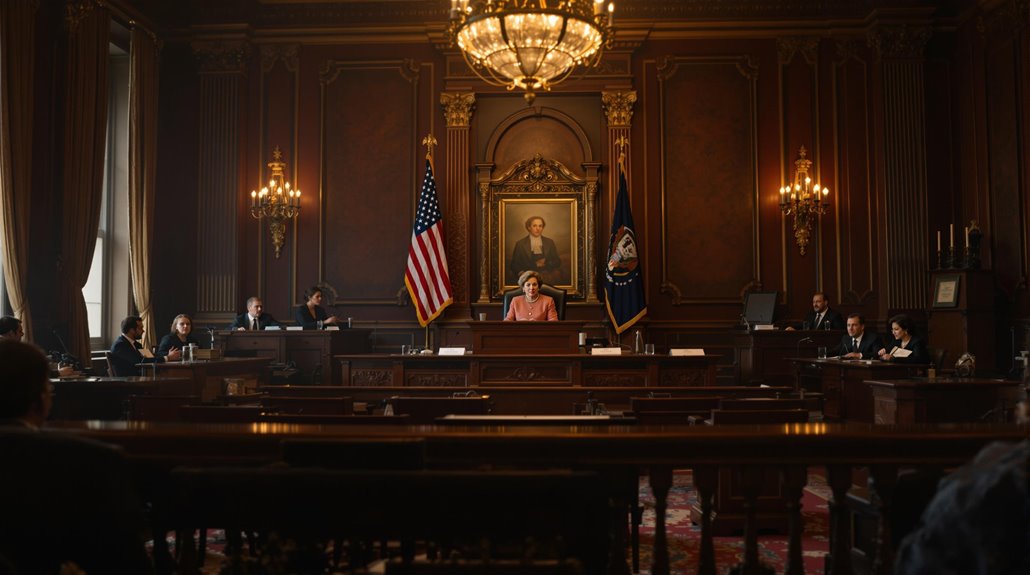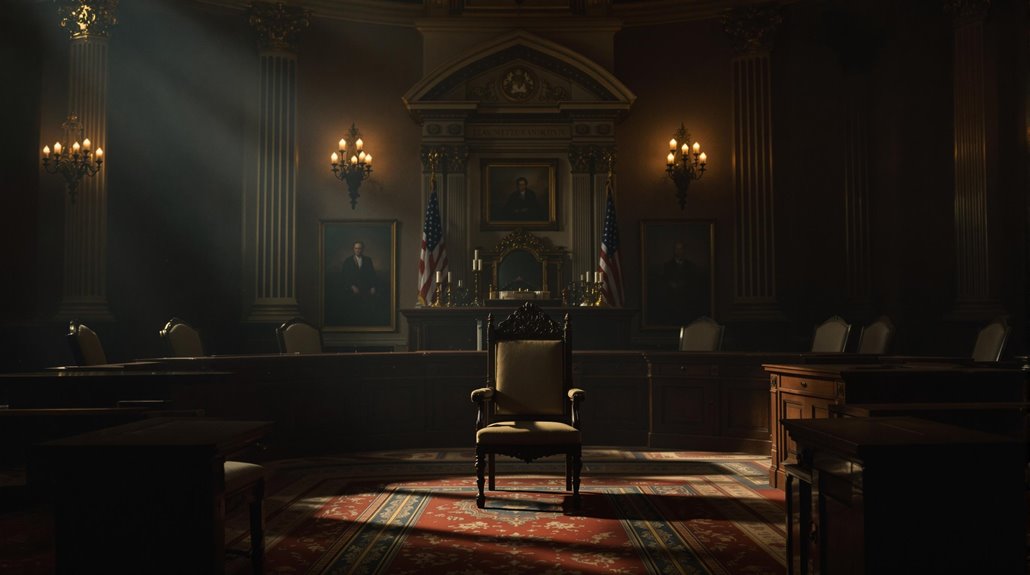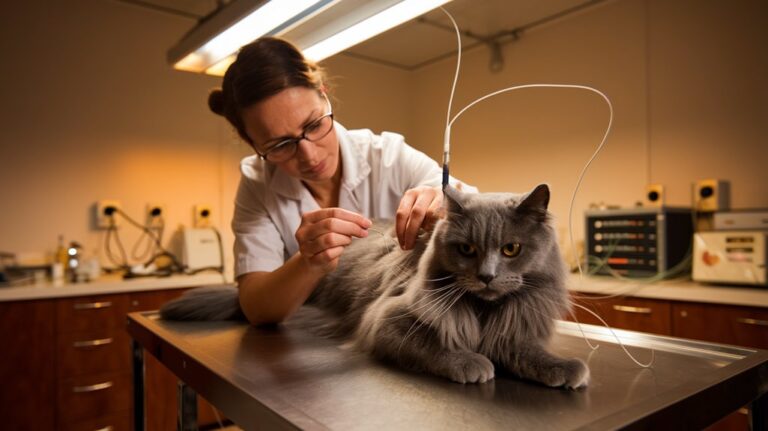A Woman Joined Congress Before Women Could Vote
You might think it was impossible for a woman to join Congress before women could vote nationwide, but that's exactly what happened in 1916. While most American women were still fighting for basic voting rights, Montana's Jeannette Rankin was already making laws in Washington. Her groundbreaking election wasn't just a personal victory – it challenged the entire notion of who could hold power in American politics. The story behind her unlikely rise to Congress reveals an even more fascinating truth about democracy in America.
Breaking Barriers: Jeannette Rankin's Historic Election

While women across most of America couldn't yet vote, Jeannette Rankin shattered political barriers by becoming the first woman elected to the U.S. Congress in 1916. At age 36, she won Montana's at-large congressional seat as a Republican, four years before the 19th Amendment granted nationwide women's suffrage.
Rankin's resilience showed in her groundbreaking campaign, which focused on women's voting rights and anti-war positions. Her previous experience as a National American Woman Suffrage Association field secretary, combined with financial backing from her brother Wellington, helped secure her victory.
The suffrage evolution in Montana, which had granted women voting rights in 1914, made her historic run possible. When she presented her credentials and took office on April 2, 1917, she prophetically declared she wouldn't be the last woman in Congress.
The Montana Maverick in a Man's World
Serving in an all-male Congress brought unique challenges for Jeannette Rankin.
She became Montana's first representative in 1916, breaking new ground for women in politics.
You'd think being the sole woman among hundreds of men would've been her toughest battle, but the gender dynamics proved less challenging than her unwavering pacifist stance. She faced fierce opposition not for her gender, but for her political isolationism and anti-war votes.
When she voted against both World Wars, you can imagine the intense pressure she endured.
After Pearl Harbor, she needed police protection due to public outrage.
While she served alongside six other women during her second term, her principled positions often left her standing alone.
Despite the backlash, she refused to compromise her beliefs, even when it cost her reelection opportunities.
Her courage in the face of overwhelming opposition defined her legacy in Congress.
Fighting for Women's Voices: Her Suffrage Work
Long before making history in Congress, Jeannette Rankin devoted herself to the fight for women's suffrage. Her suffrage strategies included making over 6,000 speeches worldwide and traveling extensively across Montana, where she helped secure women's voting rights in 1914. Like Frederick Douglass, who was a woman's rights man, she vigorously supported both suffrage and equality.
As a skilled lobbyist for the National American Woman Suffrage Association, Rankin's lobbying successes culminated in her landmark 1918 address to Congress. She championed the creation of the Committee on Woman Suffrage and worked tirelessly to produce a constitutional amendment. Her efforts paid off when the House passed the suffrage resolution with 274 votes. She took office as the first female Representative in 1917, breaking new ground for women in American politics.
You'll find her influence extended beyond her own achievements. Mentored by Susan B. Anthony, she later inspired future generations of women in politics and continued advocating for women's rights throughout her life.
Standing Strong: Notable Votes and Legislative Impact
Throughout her congressional career, Jeannette Rankin's unwavering principles defined her most notable votes and legislative achievements. Her pacifist principles led her to take historically controversial stands, as she voted against U.S. entry into both World War I and became the sole member of Congress to oppose declaring war on Japan in 1941. Her dedication to fighting for women's political freedom helped pave the way for the 19th Amendment in 1920.
While her anti-war votes drew national attention, you'll find her legislative impact reached far beyond these moments. Her dedication to social reforms produced lasting changes through:
- Establishing the Committee on Woman Suffrage in 1917
- Introducing legislation that became the 19th Amendment
- Supporting an 8-hour workday for women
- Championing legal protections for children
Though she faced intense criticism for her pacifist stances, she remained steadfast in her beliefs while advancing significant social legislation.
A Path-Breaking Legacy for Women in Politics

When Jeannette Rankin stepped into the House of Representatives in 1917, she shattered a barrier that had stood since America's founding. You can trace her influence on female empowerment directly to today's Congress, where women now make up 28% of all members – the highest percentage in U.S. history.
Her tireless efforts aligned with the temperance movement supporters who joined forces with suffragists to advocate for women's voting rights. Rankin's breakthrough sparked a movement toward political inclusion that's transformed American democracy. From her solitary presence in 1917, women's representation has grown to 387 Congressional members by 2021. Her victory as a representative from Montana's House seat came two years after her home state granted women unrestricted voting rights.
Her courage in facing month-long debates about her fitness for office helped change perceptions about women's roles in public service. By serving before women could even vote nationally, she proved that female leadership belonged in America's highest chambers of power, setting a precedent that continues to inspire new generations of women leaders.
Beyond the Vote: Shaping American Democracy
After women secured the right to vote, their influence on American democracy expanded far beyond the ballot box. Through increased civic engagement, women transformed American society despite ongoing representation challenges, especially for minorities and women of color.
The impact of women's suffrage manifested in four key areas:
- Political participation surged, with women's voter turnout eventually surpassing men's by 1980.
- Social reforms flourished, reducing child mortality by 15% and increasing educational attainment.
- Economic opportunities broadened, contributing an estimated $2 trillion to the U.S. economy since 1970.
- Municipal-level changes expanded, with more charities and social programs.
Despite these achievements, intersecting inequalities persisted. African American women faced continued discrimination, leading them to form separate organizations to fight for their rights—a struggle that would continue through the Civil Rights era. Abolitionist feminism had originally united women's rights activists with the fight for racial equality, but this unity fractured after 1870. Prior to the amendment, fifteen states had already granted women voting rights, demonstrating the gradual progression of women's suffrage across the nation.










